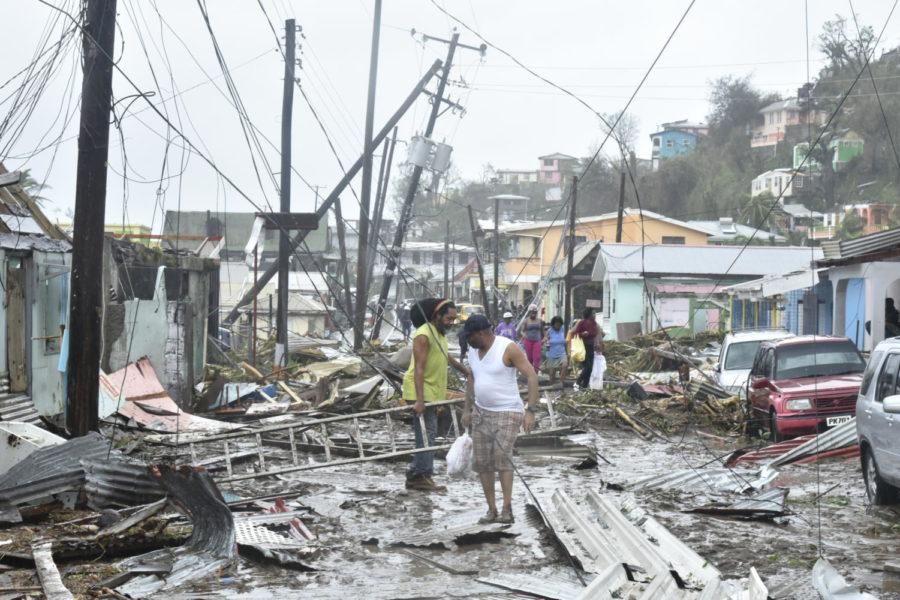Hurricane Maria: Puerto Rican students discuss tragedy one year later
“Photographs taken by my Communications Team following the passage of Hurricane Maria. These photos only show the route between Castle Comfort (lower) to Roseau,” according to Roosevelt Skerrit.
September 25, 2018
Being at Iowa State and focused on her studies, senior in environmental science Adriana Le Compte Santiago was not aware of a major storm approaching her home island of Puerto Rico last September.
Le Compte Santiago, native of Ponce, Puerto Rico, received a phone call from her mother the night before Hurricane Maria was to make landfall in Puerto Rico.
“I heard [they had prepared for the storm] that and I was in the mode of classes and work, so I really was not that worried,” Le Compte Santiago said. “You know [I thought] it was just another hurricane.”
Le Compte Santiago said that she downplayed the impact of the storm to her sister, telling her that she would would miss a day of school and that things would go back to normal.
After going on Twitter and scrolling through her newsfeed, however, Le Compte Santiago became aware of the devastation to the island from the storm.
“My heart dropped,” Le Compte Santiago said. “My mom called me the night before and said [the island] is completely destroyed and I was not expecting that.”
For Le Compte Santiago, the days following the storm were hard — especially attending classes and having to take tests.
“How is life going on still, like [people] are walking around, drinking coffee, having parties while all of this going on,” Le Compte Santiago said. “I couldn’t process that so I was always in my head during those couple days.”
Le Compte Santiago said as the days passed and not hearing from her loved ones, it became worse for her.
“It was just this [is] an isolating moment of everything I know and come from is just gone, and it’s there, but I cannot connect with it,” Le Compte Santiago said.
Laura Valderrama Figueroa, senior in biology, said she went about three to five days without hearing from her family. She said that anxiety started to build as other people she knew heard from their families, but she hadn’t heard from hers.
The Aguadilla, Puerto Rico native could recall the day she heard she received a random call while on a CyRide bus.
“I was like, ‘Oh weird,’ but I saw it was from Puerto Rico, so I knew I had to answer it,” Valderrama Figueroa said. “It was my mom, and she was like, ‘Hi, how are you?’ I had to catch my breath.”
While that week was stressful for Valderrama Figueroa, she credited the awareness and support she had from people at Iowa State to help her cope with the situation.
Valderrama Figueroa wanted to find a way to help her home island and she organized a supply drive with her sorority, Alpha Delta Pi.
“The Puerto Rican Student Association was doing one too, so I just gave them the items my sorority had collected,” Valderrama Figueroa said. “I think a better way to help out people is doing the supply drive and supporting the Puerto Rican Student Association.”
Valderrama said that she talked with KURE and shared about Hurricane Maria.
“That really helped talking about the situation, what was going on, create awareness of why we should extend our help to back home from far away or even if you’re not affected by it,” Valderrama Figueroa said.
Valderrama Figueroa returned back to Puerto Rico in December of 2017 — the first time after the storm hit.
“I was like, ‘Wow, this is so much different from the place I grew up with,” Valderrama Figueroa said.
Valderrama Figueroa said she remembered how the trees and mountains always looked green and lush. Following the storm, the green pastures were brown, and the trees did not have leaves.
Valderrama Figueroa returned to stay in Puerto Rico this past summer and could notice a shift in mentality among Puerto Ricans.
“People are very on their toes now,” Valderrama Figueroa said. “Everyone is just fast-paced motion, and even though it’s a minor [observation] it really changed.”
Le Compte Santiago said that she does believe that when it comes to relief efforts for Hurricane Maria that the the efforts have been slow.
“The relief can be seen in some places but not all,” Le Compte Santiago said. “Some places got more aid than others and that’s due to accessibility.”
Le Compte Santiago said that her family did not have major loses. She said that she is still learning and reading about the relief efforts.
“It was a really big tragedy and I don’t think it was not seen that way,” Le Compte Santiago said.
She said that she is still learning and reading about the relief efforts.
“It was a really big tragedy, and I don’t think it was not seen that way,” Le Compte Santiago said.
To Le Compte Santiago, a year later the storm is still impacting survivors and many have been deeply psychologically impacted.
“I remember my grandparents saying ‘I can’t take another one of these,” Le Compte Santiago said. “It was something that was mentally [toxic] because of frustration of getting food and water, frustration of not having your basic needs.”

















